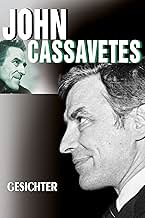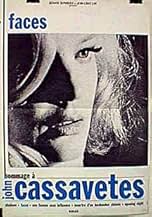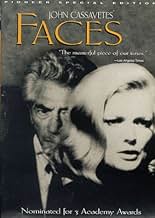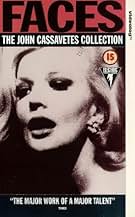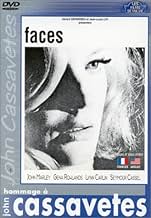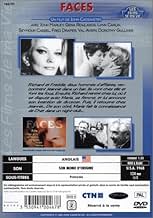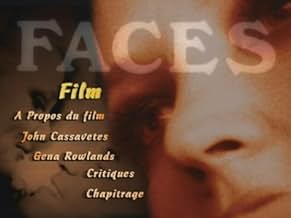Faces
- 1968
- Tous publics
- 2h 10min
NOTE IMDb
7,4/10
12 k
MA NOTE
Un homme d'âge mûr quitte sa femme pour une femme plus jeune. Peu de temps après, son ex-femme entame aussi une relation avec un partenaire plus jeune. Le film suit leurs difficultés à s'aim... Tout lireUn homme d'âge mûr quitte sa femme pour une femme plus jeune. Peu de temps après, son ex-femme entame aussi une relation avec un partenaire plus jeune. Le film suit leurs difficultés à s'aimer.Un homme d'âge mûr quitte sa femme pour une femme plus jeune. Peu de temps après, son ex-femme entame aussi une relation avec un partenaire plus jeune. Le film suit leurs difficultés à s'aimer.
- Réalisation
- Scénario
- Casting principal
- Nommé pour 3 Oscars
- 5 victoires et 9 nominations au total
George Dunn
- Comedian
- (as George Dunne)
Avis à la une
I see movies hoping that they're different. I've seen so many films that were exactly the same and that's really just a waste of time. Well, Faces is certainly different. It's hard to get through. It actually took me a week. That's because there is little action and it is hard to get interested in it. The reason why it's so original is because it is practcially a documentary on social life in this time period. It's as low budget as you get. Characters just hang around houses drinking and enjoying themselves. So I guess there isn't much of a plot, but on the good side this might be the most realistic movie I've ever seen. I really felt like nothing was unrealistic, not even a single one of the conversations. That's different. Most movies try to impress, but Faces tries to be natural. That doesn't make much sense because "natural" means you're not trying to do anything, you're just existing as you always do. Maybe that was how Faces was filmed. It definately feels natural and that's a big achievment.
An old married man leaves his wife for a younger woman. Shortly after, his ex-wife also begins a relationship with a younger partner. The film follows their struggles to find love amongst each other.
This was one of the most influential films of the 1960s, if you consider how it inspired Robert Altman and Woody Allen, as well as employing Steven Spielberg as a production assistant while he was still making short films and had not yet broken into feature films.
How well the film has aged is debatable. While its influence is clear, the film itself is not necessarily the most fun. Some have called it "meandering", and it is hard to believe that at one point Cassavetes had a six-hour cut (allegedly).
This was one of the most influential films of the 1960s, if you consider how it inspired Robert Altman and Woody Allen, as well as employing Steven Spielberg as a production assistant while he was still making short films and had not yet broken into feature films.
How well the film has aged is debatable. While its influence is clear, the film itself is not necessarily the most fun. Some have called it "meandering", and it is hard to believe that at one point Cassavetes had a six-hour cut (allegedly).
I have only recently become acquainted with Cassavetes films and I am continually impressed. This film was made on a shoestring budget filming primarily at night because the actors had day jobs. The working title, I understand, was "Dinosaurs" which sums up things up nicely. This is an important film since it shows flawed human beings especially in a time that was truly in upheaval - the late `60's. But Cassavetes was already anticipating the attempt at overthrowing the status-quo. This is a hard but fascinating film to watch. The masks, the self-loathing, the fear, the confusion of intimacy, the now tired slogan of the war between the sexes with entertainment all driven by prescription pills, alcohol and cigarettes...it's all here. Is it "real" or is it "contrived"? Even a well acted scripted play still can penetrate us. The people and conversation "inane"? You bet. Go to work or a club and listen closely -- we live lives that should never be filmed. Cassavetes films as if he's eavesdropping. Lastly - I could not imagine this film or 'Shadows' in anything but b/w....even if he COULD have afforded color stock. Excellent film.
10djb8
This movie is the epitome of brilliantly dramatic character study: It's so phenomenal, watching it is excruciating. Cassavetes takes us deep inside the lives of a bored, shallow upper-middle-class couple, and as his skilled actors improvise remarkably realistic scenes, down to the smallest mannerism of their characters, Cassavetes forces us to watch every knife-twisting second. It's difficult: Rather than watching an unpleasant situation, then getting pulled away by an editor's cut, we have to sit through all 20 or 25 minutes of a scene that makes us squirm, whether it's a middle-aged man making an ass of himself to impress a young prostitute or his wife feigning laughter to make a young man think she's having fun with him. While not the best movie I've ever seen, it's unique: A great work to whose style nothing else compares.
This is obviously not your average, everyday movie. It's some thing you could only watch at an art-house theater, so clearly this movie is not for just everyone.
John Cassavetes was a sort of guerrilla film-maker. His movies never felt like it had any storyboards or were rehearsed in any way. There was never a pre-setup plan, concerning any of its camera-work or positions and the actors all also seemed to be ad-libbing at points. They were just simply shooting away, which gives the movie a very raw and authentic feeling. I think this is the foremost reason why people really like his movies. I myself can appreciate it but that doesn't mean I'm that fond or impressed with it as well.
No, it's not really an easy or pleasant movie to watch. It's because the story is not really following a clear main plot line and things just seem to happen very randomly. I just simply prefer a more clear and straightforward story, since it also seemed to me that because of Cassavetes' approach, some of the sequences seemed to go on for ever and often weren't making that much sense for the story either.
I can still understand the story and what Cassavetes was trying to do and tell with it. It's basically a look into married life and not about any of its peachy or happy aspects. But however, like I mentioned before, I would had been more taken by it and probably would had find the story to be a more interesting one, if it had a more straightforward story and approach to it.
But yet I never hated watching this movie either. I can still definitely appreciate the way it got made and also all of the actors were a joy to watch. The movie really has some fine actors in it and I was especially fond of John Marley's performance. It were however Lynn Carlin and Seymour Cassel who received an Oscar nomination for their roles in this move.
Actually it seems quite amazing to me how this movie managed to score 3 Oscar nominations, since it's such an artistic movie, that normally would hardly get ever noticed or recognized by any of the big award shows. It perhaps says something about the popularity or status of director and writer John Cassavetes at the time or how people looked at movies.
For most people this movie will probably be too tough to bite through, or it simply won't be interesting enough to sit through but there is still a large crowd for these sort of movies out there. So if it sounds like it's your thing, chances are you'll probably end up loving it.
7/10
http://bobafett1138.blogspot.com/
John Cassavetes was a sort of guerrilla film-maker. His movies never felt like it had any storyboards or were rehearsed in any way. There was never a pre-setup plan, concerning any of its camera-work or positions and the actors all also seemed to be ad-libbing at points. They were just simply shooting away, which gives the movie a very raw and authentic feeling. I think this is the foremost reason why people really like his movies. I myself can appreciate it but that doesn't mean I'm that fond or impressed with it as well.
No, it's not really an easy or pleasant movie to watch. It's because the story is not really following a clear main plot line and things just seem to happen very randomly. I just simply prefer a more clear and straightforward story, since it also seemed to me that because of Cassavetes' approach, some of the sequences seemed to go on for ever and often weren't making that much sense for the story either.
I can still understand the story and what Cassavetes was trying to do and tell with it. It's basically a look into married life and not about any of its peachy or happy aspects. But however, like I mentioned before, I would had been more taken by it and probably would had find the story to be a more interesting one, if it had a more straightforward story and approach to it.
But yet I never hated watching this movie either. I can still definitely appreciate the way it got made and also all of the actors were a joy to watch. The movie really has some fine actors in it and I was especially fond of John Marley's performance. It were however Lynn Carlin and Seymour Cassel who received an Oscar nomination for their roles in this move.
Actually it seems quite amazing to me how this movie managed to score 3 Oscar nominations, since it's such an artistic movie, that normally would hardly get ever noticed or recognized by any of the big award shows. It perhaps says something about the popularity or status of director and writer John Cassavetes at the time or how people looked at movies.
For most people this movie will probably be too tough to bite through, or it simply won't be interesting enough to sit through but there is still a large crowd for these sort of movies out there. So if it sounds like it's your thing, chances are you'll probably end up loving it.
7/10
http://bobafett1138.blogspot.com/
Le saviez-vous
- AnecdotesWhile filming a part on Bob Hope Presents the Chrysler Theatre (1963), John Cassavetes saw Steven Spielberg lurking around the set, as he was then in the habit of doing. Cassavetes approached Spielberg and asked what he wanted to be. When Spielberg replied he wanted to be a director, Cassavetes allowed the young man to direct him for the day. He later invited Spielberg to work on this film with Spielberg serving as an uncredited production assistant on Faces (1968) for two weeks.
- Citations
Maria Forst: There's a Bergman film in the neighborhood.
Richard Forst: I don't feel like getting depressed tonight.
- ConnexionsFeatured in Cinéastes de notre temps: John Cassavetes (1969)
- Bandes originalesLove Is All You Really Want
Written by Jack Ackerman
Meilleurs choix
Connectez-vous pour évaluer et suivre la liste de favoris afin de recevoir des recommandations personnalisées
- How long is Faces?Alimenté par Alexa
Détails
Box-office
- Budget
- 275 000 $US (estimé)
- Montant brut mondial
- 7 236 $US
- Durée
- 2h 10min(130 min)
- Couleur
- Mixage
- Rapport de forme
- 1.66 : 1
Contribuer à cette page
Suggérer une modification ou ajouter du contenu manquant


